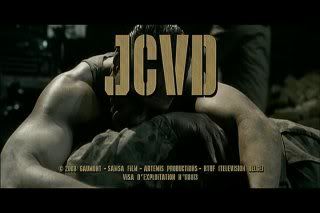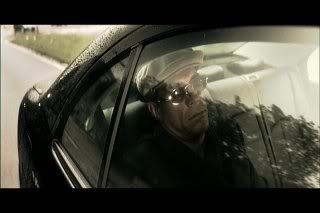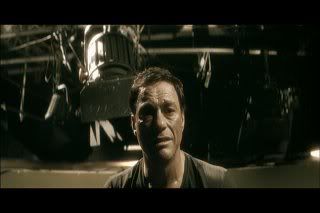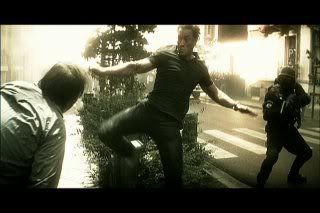
PLOT:
Who’d have thunk it? Jean-Claude Van Damme, who started his illustrious film career with the role of “Gay Karate Man” in something called Monaco Forever, has fallen on hard times. At least, that’s according to JCVD, in which a character named Jean-Claude Van Damme is played by the “Muscles from Brussels” himself, Jean-Claude Van Damme. Having lost custody of his daughter (when his movies come on TV, her friends laugh at her), an aging Van Damme discovers that the paycheck from straight-to-DVD releases just aren’t covering his legal bills. When he stops at a post office for a wire transfer he desperately needs, he inadvertently inserts himself into a robbery situation. Soon the outside world thinks JCVD has snapped, and is doing the robbery himself.

REVIEW:
Mabrouk El Mechri’s JCVD reaches for the stars, so I guess it shouldn’t surprise anyone that it doesn’t quite make it all the way there. At the root of it all is a pretty decent and offbeat heist film with an interesting protagonist. This should have been enough. Instead, El Mechri decides to get all metaphysical on his audience, playing some outdated, postmodern tricks and unnecessarily reorganizing the time line for some inexplicable reason. This is a shame, since Van Damme’s performance is really great stuff, and it could have carried the movie--if not to greatness, than at least to something quite admirable--but instead it gets bogged down by the director’s shenanigans.
Which is to say that JCDV is full of a lot of pretentious shit. It has title cards interspersed throughout, dividing the film into four sections; the cards have such titles as “The Answer Before the Question.” I thought that this was going to be a joke. I don’t think it was. I remember saying, “pretty soon they’ll start quoting Derrida.” They don’t, thank God, but they probably just didn’t get around to it. They do pull out some other ostentatious shit, though, like levitating Van Damme to the ceiling during a lengthy monologue, so that he hovers over the set and in front of the lights. SEE! IT’S REALLY A FILM! Amazing. And later we actually see the edges of the film stock during a fantastic “action-y” segment. This amounts to being clever in such a way that anyone can immediately recognize what you’re doing, and why. And then they can say, “wow, that was heavy-handed.”

This is especially frustrating, since the film shows that it can do the same sort of thing in a less ham-fisted fashion. When the police chief wants to speak to the audience, he has to ask for one of those loudspeaker horns that they have in movies. When the criminals try to negotiate, they only know to ask for the sort of things they’ve seen asked for in other heist films. The self-referential, intertextual thing they’re aiming at can be handled in a much more subtle way, and is even in the film itself.
The chronology, as mentioned, is also all out of whack. We start with Van Damme showing up in Brussels and going into the post office. The camera remains outside, and when a gunshot goes off, a police officer closes in to investigate. He sees Van Damme, and immediately suspects that the down-on-his-luck actor is robbing the joint himself. The rest of the police show up and start negotiations with Van Damme, who they speak to on the phone. They even enter the post office to see a wounded man, where it appears that Van Damme is in control of things. And then the second section starts, and we start all the way back at the start of the scene, reliving some scenes that we really didn’t need to revisit in the first place, only to discover, by gosh, that there’s another side to this story, that Van Damme isn’t the criminal after all. But we figured that out already, so it’s really just an exercise in frustration. And while the sections of the film jump around in chronology, we also get flashbacks to his custody case, and discussions with his agent, and the whole time I couldn’t help but wonder if the film would have been stronger if it had just been told in order. I have a lingering suspicion that the film was done in this way so that the audience wouldn’t pay attention to how clichéd and uninspired the actual robbery scenario is.

But, enough ragging on the film. The real star of the show is Van Damme himself, and he’s as good as you’ve heard. The film is at its best when it focuses on him, without all the hoopla. We watch him try to deal with fans, some of whom think he’s amazing, and some of whom take him to task for thinking he’s a big shot. We watch him consult with his agent; he asks if his agent can negotiate a production credit for Van Damme, if the star agrees to take a pay cut. Then he asks if he can get a role in a real, Hollywood film, if he’s willing to work for scale. You get the impression that Van Damme has probably had these discussions with his agent before.
Then there’s the levitation scene, where Van Damme really pours it all out. It’s self-serving and self-aggrandizing as hell, but something about its rambling incoherence makes it seem sincere. When the man starts crying you really feel it, even if you resent the way the message is delivered. However, one has to wonder how the filmmaker reconciles the attempt to get at the "real" Van Damme with the deliberate artificiality of JCVD. It's not a reconciliation that the film attempts.
JCVD could have been a decent, harmless little heist film anchored around a powerful performance by Van Damme; instead, it’s a fucking pretentious mess.










No comments:
Post a Comment